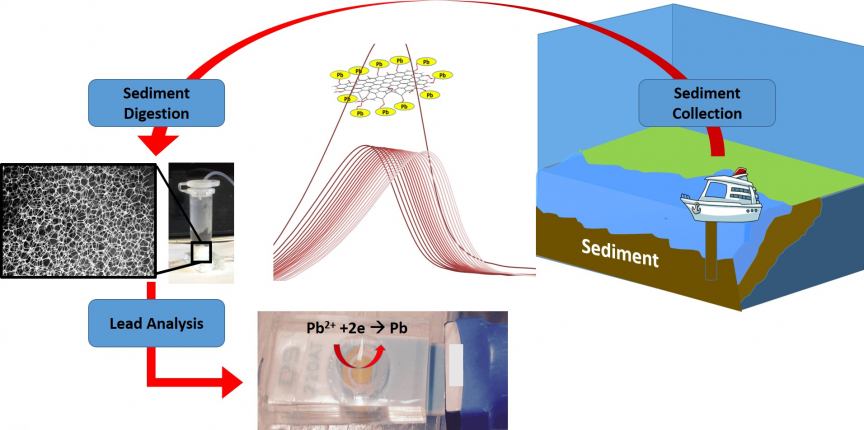Aug 27 2020
Researchers from Rutgers University have developed a miniature device that can measure even trace levels of toxic lead included in sediments at the bottom of rivers, harbors, and other waterways within a few minutes.
 Sediments collected by a ship can be rapidly tested for toxic lead with a new portable lab-on-a-chip device. The miniature device extracts lead from a sample and purifies it, using graphene oxide as a lead detector. Image Credit: Azam Gholizadeh.
Sediments collected by a ship can be rapidly tested for toxic lead with a new portable lab-on-a-chip device. The miniature device extracts lead from a sample and purifies it, using graphene oxide as a lead detector. Image Credit: Azam Gholizadeh.
The new affordable lab-on-a-chip device performs measurement quite faster compared to existing laboratory-based tests, which require several days to complete.
In addition, the device could enable water companies, municipalities, K-12 schools, universities, homeowners, and daycares to quickly and easily test their water supplies. The study was reported recently in the IEEE Sensors Journal.
In addition to detecting lead contamination in environmental samples or water in pipes in homes or elementary schools, with a tool like this, someday you could go to a sushi bar and check whether the fish you ordered has lead or mercury in it.
Mehdi Javanmard, Associate Professor, Department of Electrical and Computer Engineering, School of Engineering, Rutgers University–New Brunswick
“Detecting toxic metals like lead, mercury and copper normally requires collecting samples and sending them to a lab for costly analysis, with results returned in days,” added Javanmard, who is the senior author of the study. “Our goal was to bypass this process and build a sensitive, inexpensive device that can easily be carried around and analyze samples on-site within minutes to rapidly identify hot spots of contamination.”
The focus of the study was to analyze lead in sediment samples. In New Jersey and across the United States, many river sediments are contaminated by industrial and other waste dumped several decades earlier.
It is crucial to properly manage contaminated dredged materials from navigational channels to reduce the possible effects on plants, agriculture, food supplies, and wildlife. If contaminated areas were quickly identified, cost-effective and timely programs could be set up to manage dredged materials.
The new device draws out lead from a sediment sample and uses a thin film of graphene oxide as a lead detector to purify it. Graphene is an atom-thick layer of graphite, the writing material used in pencils.
Additional studies are required to substantiate the performance of the device further and enhance its durability to transform it into a viable commercial product, probably within a period of two to four years.
This study was performed in collaboration with the Department of Electrical and Computer Engineering and Rutgers’ Center for Advanced Infrastructure and Transportation (CAIT). It was financially supported by CAIT, the USDOT-University Transportation Research Center–Region II.
Azam Gholizadeh, who earned a doctorate at Rutgers, is the lead author of the study.
Co-authors of the study are Sakshi Sardar, who also earned a doctorate; Kelly Francisco, a postdoctoral research associate at CAIT; Ali Maher, CAIT director and a professor in the Department of Environmental and Civil Engineering; and Robert Miskewitz, an associate research professor in the Department of Environmental Sciences in the School of Environmental and Biological Sciences.
Journal Reference
Gholizadeh, A., et al. (2020) Towards In-Situ Environmental Monitoring: On-Chip Sample Preparation and Detection of Lead in Sediment Samples Using Graphene Oxide Sensor. IEEE Sensors Journal. doi.org/10.1109/JSEN.2020.3006021.